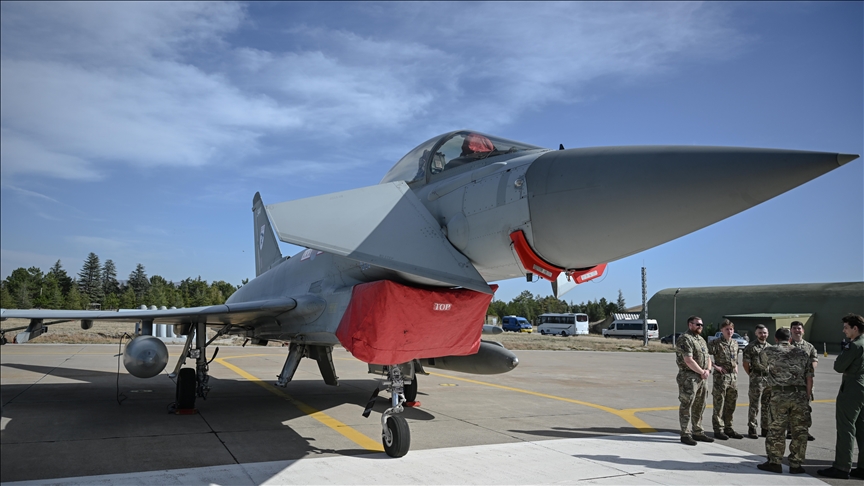OPINION - Eurofighter Typhoons: A new chapter in Türkiye-Britain-Europe defense cooperation
By acquiring Eurofighter Typhoons, Türkiye's important role as a leading NATO member state, as well as a vital partner for defending Europe's security interests in general, was strengthened even further

The author is the director of Economyfirst Limited, London.
ISTANBUL
Whilst the European Union, including its foreign-policy machinery, continues its political soul-searching post-Brexit, the United Kingdom and the Republic of Türkiye are on a path to perfect bilateral cooperation, eventually including other nations like Germany, Italy, and Spain. At stake: ultimately much more than the Eurofighter Typhoon, yet nothing better than yesterday's Ankara defense deal to get going.
Sometimes political upheavals in Britain—a Cabinet reshuffle, the migrant boat crisis, or even the Prince Andrew–Epstein saga—lead officeholders to pursue proactive foreign-policy moves to distract the public from just those upheavals; on the one hand there are instances of rather lukewarm and insignificant efforts not making it into the history books at all, whilst on the other hand there are notable exceptions of when that very nation-state struggling primarily with domestic issues sets trends with regards to putting exactly that nation-state back onto the global map.
Defense, but trade 2.0 in focus, too
The countries mentioned in the introductory paragraph, together with the United Kingdom, form part of the Eurofighter Consortium, and for quite some time, there were hesitations within the consortium to allow Türkiye to purchase Eurofighter Typhoons. As it emerged over time, it was in particular London pushing the fellow consortium nations to give the green light, and late last night it happened in the Turkish capital—20 Typhoon jets will soon be sold to Ankara for the financial tune of €6 billion [1]. Of course, Türkiye is in talks with other fighter jet manufacturers, such as Qatar or Oman, respectively, but from a European perspective, British Prime Minister Keir Starmer's deal with the Turkish President Recep Tayyip Erdogan is a landmark development. Starmer reiterated Türkiye's proactive role in NATO during his visit, whilst Erdogan spoke of the merits of a UK-Türkiye strategic partnership and indicated that even more defense cooperation between both states might follow.
It should not be overlooked that Typhoon aircraft are state-of-the-art and highly sought-after products and, besides the four consortium member countries, are used by only one more European nation, namely Austria, plus a number of Gulf countries.
The fact that in the near future, Türkiye will join that exclusive club is of great significance in a variety of ways. First, Türkiye's important role as a leading NATO member state as well as a vital partner for defending Europe's security interests in general was strengthened even further. Second, Türkiye's unique geopolitical and geographical position was finally understood and appreciated by the Eurofighter Consortium. Third, by ending a rather extended period of misunderstandings from the side of many European nations via-a-vis Türkiye, the doors have been opened to begin a completely new phase of cooperation benefiting all partners.
And there are other issues that must be duly noted in connection with the Typhoon deal. Post-Brexit Britain, over time, turned itself once again into a global force and especially by means of engaging in bilateral trade agreements. London understands all too well that trade is often the key to opening doors to much wider strategic alliances. Where business goes first, politics often follows suit. Trade allows both partner countries to improve their respective domestic economies and create much-needed employment options. Already quite remarkable, it was announced yesterday that the bilateral trading volume between Britain and Türkiye could at one point in the mid-term future reach a staggering $40 billion. Already today, bilateral trade is flourishing, and what might come as a surprise to unwitting observers is that it is no one-way street; to the contrary. One only has to take a look at so-called large white household goods, think fridges or dishwashers—the British consumer appreciates Turkish top quality, and even more so as comparable products manufactured by other nations' manufacturers are often sold at higher prices. Turkish quality leads the way once correctly viewed from a "top quality price tag perspective."
And to add a final observation: British-Turkish trade relations are already at such a good level that both nations now begin considering entering into what is referred to as third-country joint investments. Example: Two companies, with one being based in Britain and the other being based in Türkiye, decide to jointly conquer a third country's market, perhaps closer to home in continental Europe or further afield, such as Asia or Africa. Whilst both partner nations would greatly benefit by promoting "made in Britain and made in Türkiye," the third partner country would enjoy unparalleled access to experience and technology and top-quality goods. This, in turn, keeps employment in Britain and Türkiye yet allows the third country to improve its economic standing as well; certainly, a win-win-win situation, so to speak.
20 Eurofighter Typhoons are on their way to Türkiye in the near future – British-Türkiye bi-lateral relations 2.0 are already with us in the present time.
[1] https://www.baesystems.com/en/article/turkiye-typhoon-contract
*Opinions expressed in this article are the author's own and do not necessarily reflect Anadolu's editorial policy
Anadolu Agency website contains only a portion of the news stories offered to subscribers in the AA News Broadcasting System (HAS), and in summarized form. Please contact us for subscription options.



